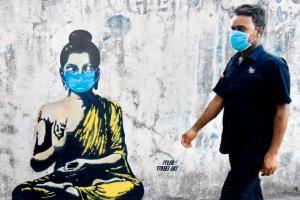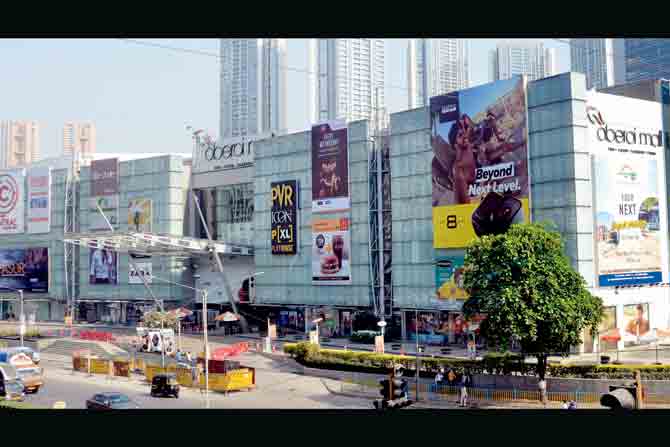Can a tragedy carry with it a blessing? And can one disaster hold precious lessons to avoid another imminent one? Here's why behavioural lessons intrinsic to the coronavirus pandemic must be applied to the climate change battle

Pic/ Getty Images
Climate change needs the publicity machinery of coronavirus, said one of the memes to have emerged as a response to the worldwide pandemic. Without making light of the problem at hand, however, is the fact that our response to climate change needs to be assessed.
A March 13, 2020, report published and available on the Washington Post website states that pollution levels in China and Italy—two countries on the coronavirus warning list to have enforced a severe lockdown on human movement—have dropped drastically.
An analysis of data from the European Space Agency's Sentinel-5P satellite, the Post said, showed that concentrations of nitrogen dioxide, have fallen drastically over north Italy. No2 is produced from combustion by cars, power plants, and other industrial sources. While contributing to warming, it also increases the risk of asthma and inflammation of the lungs among other health conditions.
 Nandikesh Sivalingam
Nandikesh Sivalingam
The question to ask is that if certain behavioural changes that have been implemented on a large scale during this period—mandatory work from home has reduced vehicular traffic movement restrictions have led to a cut in consumption and eating out; air travel has fallen sharply—can be replicated to combat climate change.
UK-based Dr Rupert Read from the University of East Anglia (and Extinction Rebellion), says, "The lockdown of entire countries gives us an opportunity to reassess the sort of society we have created. We should reflect on the extreme fragility of our globalised world. The fact that a virus can spread so fast and shut down large sections of the global economy in a matter of months should deeply worry us. This is especially relevant in the context of catastrophic climate change, which threatens to do much the same, but on an unimaginably magnified scale. If we want to get serious about minimising harms like this, then we should scale back globalisation and reduce the extent to which countries require international trade and travel. Producing more stuff on a local or regional level will innoculate us against the types of supply line disruptions that we can expect catastrophic climate change to bring. Reducing international travel will also reduce harmful emissions."
He adds that work-from-home policies, replacing in-person meetings with well-worded emails or video-conferencing, "are preferable from an ecological perspective, more efficient timewise, and much more family friendly—allowing people with children to work from home". "The reduction in air pollution that such measures lead to would also vastly reduce respiratory disease, making people less vulnerable to viruses like this in future. We should seek to preserve these lessons once the lockdowns end."
A report on the CNN website, quoting the Center for Research on Energy and Clean Air (CREA), an air pollution research organisation, stated that CREA reported a 25 per cent drop in emissions from China, one of the world's biggest polluters, from February 3 to March 1. "As the world's biggest polluter, China contributes 30 per cent of the world's CO2 emissions annually, so the impact of this kind of drop is huge, even over a short period. CREA estimates it is equivalent to 200 million tons of carbon dioxide—more than half the entire annual emissions output of the UK," stated the March 17 report by Rebecca Wright.
However, the same report goes on to add that once the threat has passed, China will be focused on restarting its economy, which has been hurting on account of the US-China trade war. "That could come at the expense of the environment."

An empty SV Road in Bandra. Pic/ Pradeep Dhivar
Is there a way then that we could use the break that the planet has got right now, to examine how we can change our lifestyle and arrest global warming?
Nandikesh Sivalingam, director at the Delhi-based CREA, says it is important that governments start looking at alternatives to fossil fuels and creating a sustainable and green economy. "We should have job creating avenues that are non-polluting and look at moving ahead in terms of understanding the learnings from this."
But, what about economic growth. The Indian economy, expected to grow five per cent in the current fiscal, the slowest in 11 years, is set to take a hit thanks to COVID-19. And, this pattern will be seen worldwide.
Read says, "Countless more people will find themselves destitute unless governments are willing to take radical redistributive action. Beyond this, we should also be looking to question who exactly our economies are currently working for. The economic growth of the last few decades has been characterised by vastly deepening wealth inequalities, while consumption patterns have been ecology-wrecking. The fact is that even before the millions of job losses that we are now seeing in response to the virus, most economies were not working for most people anyway. We should see this crisis as an opportunity to reset our attitude towards economics. Instead of focussing on perpetual economic growth, we ought to reduce overall global consumption and redistribute resources more fairly. This reduction in consumption will weaken the harms of climate collapse, and this redistribution will lead to more people being better able to withstand those harms."
There are other lessons that governments—not just India—need to learn from the current situation. And, prime among these, says Sagar Dhara, environment engineer, is risk minimisation.
Dhara fears that the total number of coronavirus cases detected in India is far too less. It was 169 on Thursday. "India is as mobile a society as Europe which has been badly hit by the virus. And, where the WHO is saying 'test, test, test', the DG ICMR is not doing it."
Specialising in risk analysis, Dhara explains that the doubling time of the cases is 6.5 days and the incubation period during which a patient is asymptomatic is a
week or so. In that period, if the person comes in contact with others, they will transmit the infection. So, for every one detected case, there are at least three undetected cases and "India's testing is grossly insufficient for a high population country that is highly mobile."
"When the epidemic reaches the third stage—community transmission—we won't be able to handle the situation as our health care and emergency response systems are woefully inadequate. Our record of handling disasters is a disaster itself. And, it's not just us. The Chinese government tried to hide the coronavirus facts initially, and that's what we are doing right now. Figures from the US, too, are impossibly low."
 Goregaon's Oberoi Mall last week. Traffic, and therefore, harmful emissions have dropped in the city. Pic/ Satej Shinde
Goregaon's Oberoi Mall last week. Traffic, and therefore, harmful emissions have dropped in the city. Pic/ Satej Shinde
When the permafrost in Siberia melts, it has been speculated, viruses frozen in it will be out in the atmosphere, and what they may do is anyone's guess. And with further environmental destruction, more unknown viruses may jump from forests and animals to humans, and with global warming, cases of malaria and dengue will rise.
Dhara says, "We must carry out risk minimisation and people must put pressure on governments to do this. Even in India, cases of the COVID-19 are highest in areas that see more emissions and travel—Maharashtra, Kerala, Delhi, Haryana, Hyderabad. There are few detected cases in Odisha and northeast India, which are low travel states. It's the same pattern in the US. Risk minimisation is all the more important due to climate change."
Climate campaigner, Nayomie Prasad Kapur, says, "That we have to wait so long for a vaccine is a testament to the fact that we are woefully unprepared. The only thing holding us back from collectively making the changes we need to is the false belief that a change towards ecological sustainability will prove more disruptive than any surprise nature throws at us. SARS-Covid-19 is proving that those beliefs are unfounded."
Catch up on all the latest Mumbai news, crime news, current affairs, and also a complete guide on Mumbai from food to things to do and events across the city here. Also download the new mid-day Android and iOS apps to get latest updates
 Subscribe today by clicking the link and stay updated with the latest news!" Click here!
Subscribe today by clicking the link and stay updated with the latest news!" Click here!









